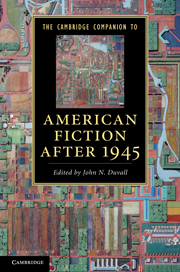Book contents
- Frontmatter
- Introduction: A story of the stories of American fiction after 1945
- PART I POETICS AND GENRES
- PART II HISTORICAL AND CULTURAL CONTEXTS
- 6 African American fiction
- 7 American Indian fiction
- 8 Multiethnicities: Latino/a and Asian American fiction
- 9 American Jewish Fiction
- 10 Feminist fiction
- 11 Southern fiction
- 12 Fiction and the Cold War
- 13 Fiction and 9/11
- PART III MAJOR AUTHORS
- Conclusion: Whither American fiction?
- Index
- Cambridge Companions to …
9 - American Jewish Fiction
from PART II - HISTORICAL AND CULTURAL CONTEXTS
Published online by Cambridge University Press: 28 March 2012
- Frontmatter
- Introduction: A story of the stories of American fiction after 1945
- PART I POETICS AND GENRES
- PART II HISTORICAL AND CULTURAL CONTEXTS
- 6 African American fiction
- 7 American Indian fiction
- 8 Multiethnicities: Latino/a and Asian American fiction
- 9 American Jewish Fiction
- 10 Feminist fiction
- 11 Southern fiction
- 12 Fiction and the Cold War
- 13 Fiction and 9/11
- PART III MAJOR AUTHORS
- Conclusion: Whither American fiction?
- Index
- Cambridge Companions to …
Summary
Irving Howe, in the introduction to the 1977 collection, Jewish-American Stories, poses an unsettled and unsettling question: “What is the likely future of American Jewish writing?” Howe's problematical response bears the weight of an anxious history of Jewish exile. American Jewish writing, in the second half of the twentieth century had, Howe contends, “probably moved past its high point,” having found “its voice and its passion at exactly the moment it approache[d] disintegration.” The culture of Yiddishkeit – the distinctive ethos of a culture derived from the Yiddish-speaking Jews of Eastern and Central Europe – was diminishing from the urban landscapes of American Jewish sensibilities, absorbed and attenuated by the mainstream culture to which it aspired. American Jewish writers, Howe contended, ran out of literary steam, a situation certainly no-good-for-the-Jews, to borrow a phrase from Philip Roth, and counterintuitive given the Jewish penchant for words. For if they do little else, Jewish characters in and out of literature talk. The urban landscape of American Jewish literature has, since the fiction of the immigrant and through the end of the twentieth century, resonated with sound, with characters who talk their way through their self-invented lives.
Most certainly there has continued now beyond the twentieth century a long tradition of Jewish storytelling, established well before the arrival of the immigrant on the shores of America, a tradition of talking lives, a language of memory and desire. This tradition developed out of the rich Yiddish conventions of storytelling, established notably by the Eastern European writers Sholom Aleichem , Mendele Mocher Sforim , and I. L. Peretz and brought to America most prominently by I. B. Singer.
- Type
- Chapter
- Information
- The Cambridge Companion to American Fiction after 1945 , pp. 129 - 141Publisher: Cambridge University PressPrint publication year: 2011



